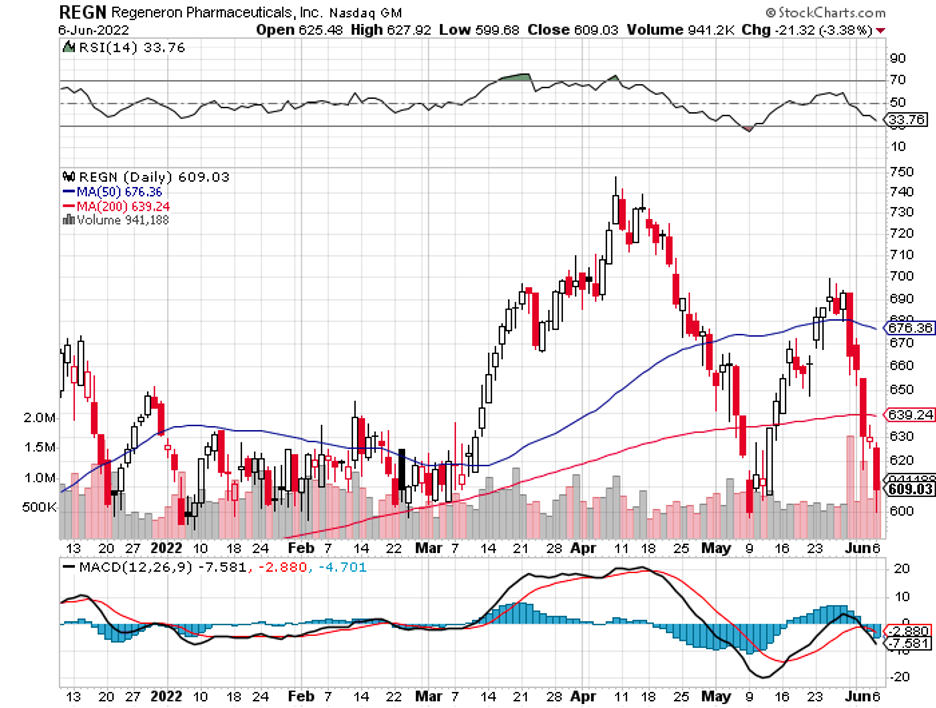A Low-Key Biotech Set for a Bull Run
Biotechnology stocks have been sliding for months now, but scientific advancements are not slowing down.
The public’s focus on messenger RNA and gene editing may have dwindled, but the fact remains that more and more patients are benefiting from the discoveries.
More importantly, new treatments are well on their way to clinical trials.
That’s why I think Regeneron (REGN) could easily be one of the big winners in the coming years.
Despite the economic slowdown, Regeneron shares are doing okay. They have actually practically doubled since the start of 2020, when the biotech was thrust under the spotlight for its anti-COVID antibody cocktail, REGEN-COV.
Its popularity heightened when then-president Donald Trump used its treatment.
While the demand for REGEN-COV has since declined, the drug still raked in $7.5 billion in sales in 2021.
However, that would most likely not be the trend since it was proven to be not as effective against the newer strains. In addition, the FDA significantly limited the situations in which the antibody cocktail can be used.
For the foreseeable future, Regeneron shareholders’ earnings are primarily dependent on macular degeneration treatment Eylea and asthma and dermatitis drug Dupixent.
For Eylea, which Regeneron shares with Bayer (BAYG) outside the US, sales grew by 19% in 2021 to record $9.4 billion.
A vital issue Eylea faces is its expiring US patent by mid-2023, which will probably lead to more aggressive biosimilar competition as early as 2024.
Aside from that, more and more rivals are emerging, such as Beovu from Novartis (NVS) and Vabysmo from Roche (RHHBY).
Luckily for Regeneron, Beovu hasn’t gained traction due to safety issues, while Vabysmo is still struggling to establish itself as a viable alternative.
Thanks to its entrenched position as an undisputed market leader, Eylea sales will continue to be a top-selling treatment.
While things are still going well for Eylea, Regeneron has been proactive in establishing Dupixent as another key growth driver.
Dupixent, which was co-developed with Sanofi (SNY), showed off an impressive 51% jump in sales last year to rake in $6.2 billion—and this isn’t the peak yet.
Dupixent is estimated to reach over $14 billion in sales in the following years due to expanded markets.
Sales of this newer drug have caught up with Eylea’s in the past years.
In fact, Dupixent is projected to overtake Eylea sales by 2024, with the figure almost doubling by 2025 compared to the 2021 revenue.
In terms of competition in the atopic dermatitis sector, Dupixent is challenged by Rinvoq from AbbVie (ABBV), Cibinqo from Pfizer (PFE), and Opzelura from Incyte (INCY).
Nonetheless, Dupixent still looks well-positioned to expand into current and new indications in the following years and be able to fight off competitors.
It is critical for any biotechnology and healthcare business to maintain a solid pipeline to respond to upcoming patent losses and the rise of generic competition.
In this aspect, Regeneron has been performing excellently.
It has several treatments queued that complement the existing blockbusters, Eylea and Dupixent, and bolster the long-term growth prospects.
A good example is the company’s experimental treatment Aflibercept, which is slated to release Phase 3 results in the third or fourth quarter of 2022.
If this succeeds, it can enhance and strengthen Eylea’s efficacy, allowing Regeneron to retain its dominant position in the retinal market.
The company is also working on getting the green light for seven new indications on Dupixent-related treatments, which would be out by late 2022 and early 2023.
Another area under Regeneron’s radar is oncology.
While it’s cancer portfolio isn’t likely to become a significant growth driver anytime soon, there’s definitely potential here—and the potential comes in the form of in-house combos with Libtayo.
Libtayo, a cancer checkpoint inhibitor, is the most significant drug candidate in Regeneron’s oncology pipeline today.
Although it’s a latecomer to the field, Regeneron has become one of the frontrunners in the skin cancer segment with the approval of its cutaneous squamous cell carcinoma indication and the addition of the basal cell carcinoma label.
However, those are relatively minor markets. In terms of infiltrating a major market, Libtayo’s first venture is into the lung cancer sector.
But, this could be challenging since Merck’s (MRK) Keytruda has a firm hold of this market.
Still, Libtayo has the potential to achieve blockbuster status—a goal that Regeneron looks to be aggressively pursuing.
Aside from skin and lung cancer treatments, Regeneron has been developing Libtayo-based candidates for prostate cancer treatment REGN5678 and ovarian cancer therapy REGN4018. It is also working on another lung cancer treatment, REGN5093, to hopefully bolster its foothold in this lucrative market.
Needless to say, approval of these cancer treatments would be an incredible game-changer not only for cancer patients but also for Regeneron.
Overall, Regeneron is an outstanding biotechnology company and investment option. The success of its blockbuster treatments will offer a strong foundation for the company’s future growth.
If you add the more than 30 pipeline candidates of Regeneron in the mix, then it’s easy to see that a bull run might just be on the horizon for this stock.
While regulatory hurdles and emerging competitors would present challenges, it’s clear that Regeneron has these issues under control.
Moreover, the company’s pipeline has clearly shown that it’s ready to meet the challenges head-on. Hence, it would be advisable to buy the dip.

